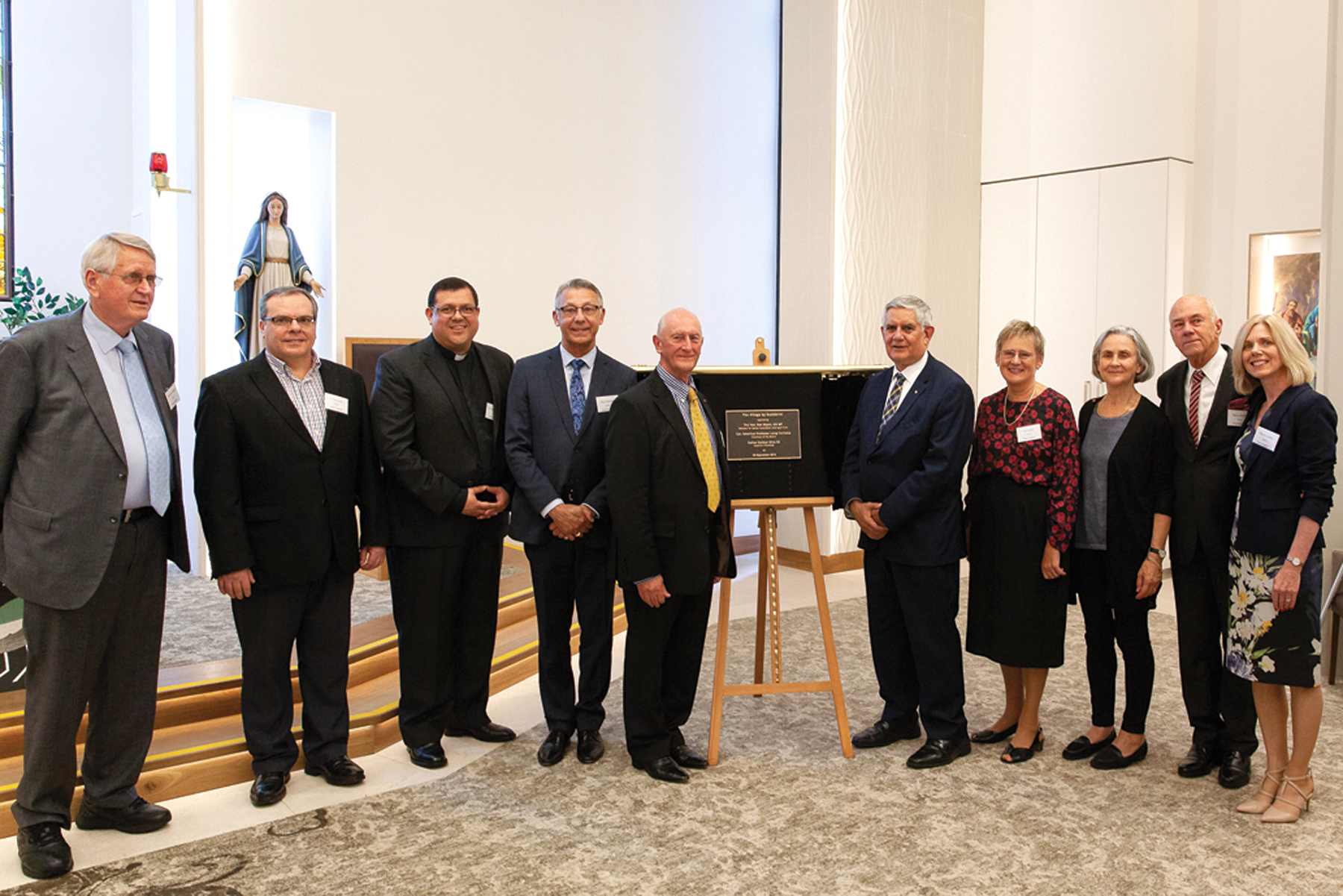The new state-of-the-art structure is specifically designed to support and enrich the lives of those living with dementia or age related complex care needs.
Also present at the ceremony were John Sidoti MP, Member for Drummoyne, Senator Concetta Fierravanti-Wells, Mayor of Canada Bay Angelo Tsirekas, Professor and Executive Director of Dementia Training Australia, Richard Fleming, and Father Delmar Silva CS, Provincial Superior of Scalabrini.
In his welcome address, President of Scalabrini Villages, Prof. Leroy Certoma said that he was delighted to celebrate the journey of Scalabrini Village over the last 50 years.
He described the journey as beginning with an idea and culminating in the official opening of the flagship facility, The Village by Scalabrini.
The facility was awarded the prestigious Best Aged Care Facility Award earlier this year during the Australian Healthcare Week.
In an interview with La Fiamma, Prof. Certoma described the facility as consisting of 126 rooms, clustered into homes which are known as case.
There are between six and 14 residents in each of these homes, and all rooms open onto social or living areas, rather than onto a corridor.
Speaking of the residents, Prof. Certoma said: “When they open their door, they are looking directly onto a living area.
“It’s like living at home. There is still that sense of family.
“The Scalabrini mission has always been about providing the best possible care.
“The so-called ‘Sono-io’ (‘This is me’) model of care recently adopted by Scalabrini represents a departure from traditional institutionalised routines in care.
It embraces the needs and choices of the individual, enabling them to continue to enjoy a dignified life within a family-like environment.”
The Scalabrini model of care is based on its Italian heritage.
While some of the seven residential villages across NSW have a high proportion of Italian residents (up to 50 per cent), others have a smaller proportion.
Prof. Certoma emphasised that the Scalabrini Villages are “open to all residents without discriminating on race, religion, or background”.
“Every village has live-in religious sisters who provide pastoral care,” he said.
“They are a great comfort to all residents, and they embrace all people regardless of their religious orientation.”
Prof. Certoma also emphasised that the system is in continual evolution.
He said that the government has recently been focusing on ensuring that the elderly are equipped to stay at their traditional homes, for longer.
Last week, the Australian Government announced that it will invest an additional $100 million over two years to support senior Australians to remain living independently in their own homes.
“This is of course a good thing,” Prof. Certoma said.
“But it means that the system is changing. Residents enter the aged care system later, and consequently there is greater demand for high-care, dementia and palliative care.
“The system is therefore in constant evolution and we are focused on making it better and better.”
Scalabrini is currently conducting a food and dining review across their facilities in NSW.
“Of course you can never please everyone,” Prof. Certoma laughed.
“But we pride ourselves on a high quality of food and dining services, to provide enjoyment, nourishment and importantly, the ability to choose.”
Dining at Scalabrini includes menus, which offer a variety of fruit, vegetables, fish, meat and pasta.
Prof. Certoma said that Scalabrini spends double the national average in the sector on food.
The official opening of the Village by Scalabrini comes at a turbulent time in the history of Australia’s aged care sector, following the recent airing of the two part investigative series by Four Corners into the failings of the aged care sector, entitled ‘Who Cares?’
The series investigated the treatment of the elderly in aged care homes ahead of the new royal commission inquiry, which was announced by Prime Minister Scott Morrison just days before the program went to air.
The series revealed that many facility staff across Australia were failing to meet the needs of elderly people in their care.
In many facilities, staff-to-resident ratios were extremely low with staff members having just five minutes dedicated to each frail person in which they were expected to get them out of bed, washed, and ready to eat.
The national average spent on food was reported to be at just $6.08 per day.
There were also reports of abuse within certain centres, with the most horrifying filmed incident depicting aged care worker Dana Gray, 59, physically abusing a dementia patient while working in The Poplars aged care home in North Epping.
Following airing, the aged care sector was quick to respond to the evident areas of severe neglect depicted by the shocking series.
Minister for Senior Australians and Aged Care Ken Wyatt, said he was “appalled by the lack of care” shown for older adults.
He said in a statement: “[The stories] have highlighted the importance of the reform agenda we are implementing to increase the regulatory oversight of Australia’s aged care sector.
“We have to prepare ourselves for the royal commission to uncover some pretty bruising information about the way our loved ones have been mistreated.”
In response to queries about the program, Prof. Certoma stated “that’s not systemic”.
“Those were some of the worst possible cases in aged care,” he added.
“The problem with that program is that it did not present examples of any good aged care facilities.
“Our staff to resident ratio is better, and we have a good ratio of registered nurses among carers.
“There is always a registered nurse at the facility, on-call 24 hours a day.”
When queried on whether he thinks the government will increase funding to the sector, Prof. Certoma said that “the government is moving toward better services but they want to keep control of how much they contribute and they want residents to contribute as well”.
The innovative approaches of Scalabrini and their high levels of care have been recognised nationally and internationally over the years.
They were the recipients of two Better Practice awards from The Australian Aged Care Quality Agency in 2017.
The latest facility Village by Scalabrini includes new technologies, which allow for the care of persons with high and complex needs or dementia to enjoy life with the minimal intrusion on their independence.
















